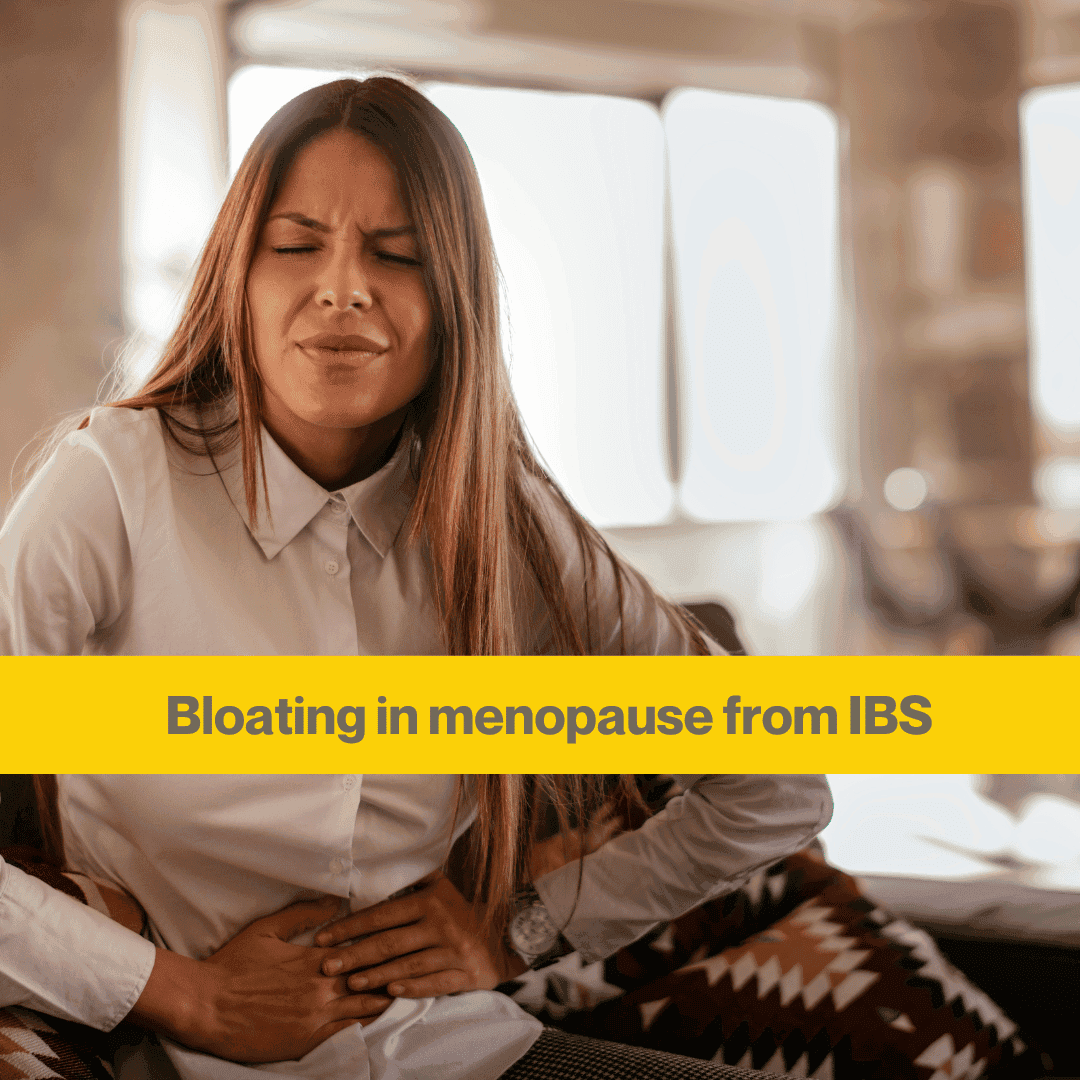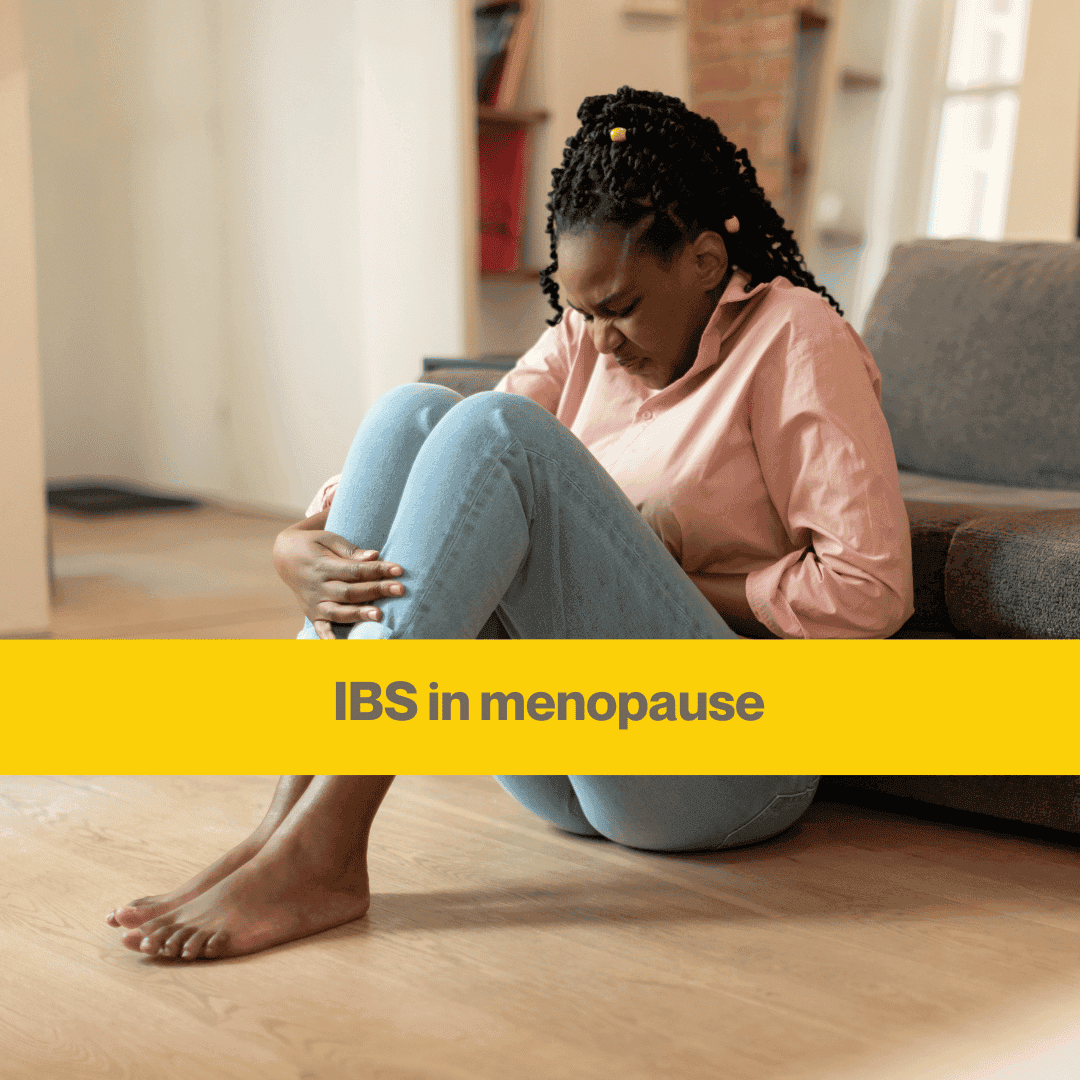Part 3 – Bloating in Menopause
If you’re in perimenopause or menopause and dealing with IBS, you may feel like your body is working against you. Your gut feels unpredictable, your energy is already low, and even eating a normal meal can leave you feeling uncomfortable and out of sorts.
Many women I work with describe feeling like their stomach has turned into a pressure cooker – swollen, sore, and heavy. Others say food sits inside them like it’s stuck, and everything feels sluggish. By the evening, clothes feel tight and uncomfortable, and the idea of eating dinner feels more risky than a pleasure.
It’s not just the physical discomfort that’s difficult. It’s the constant mental load. Wondering what’s safe to eat, worrying about symptoms at work. Maybe you feel guilty for cancelling plans because your gut has flared again.
When you’re already busy, stressed, and tired, gut symptoms can feel like the last straw.

Why menopause makes bloating worse
Hormone changes at this stage of life can stir up IBS symptoms and make bloating more frequent and intense.
Here’s how hormone changes affect your gut:
Digestion slows down – with less progesterone, food can take longer to move through the intestines, leading to constipation and more gas.
- Reduced bile flow – bile helps digest fats, supports motility and it is also antimicrobial, helping to keep the small intestine clean. When bile is sludgy you might find more constipation, or trouble digesting fats.
Your gut might become sensitive – lower oestrogen makes nerves in the digestive tract more sensitive, so a small amount of gas can feel like painful pressure.
The balance of gut bacteria shifts – this can mean more fermentation (which means more gas), and less predictability in your bowel habits. Read more about hormones and gut bacteria.
Fluid balance changes – hormone fluctuations can affect water retention which can leave you feeling puffy.
Add in disrupted sleep, stress, or coping with hot flushes and fatigue, and it can all feel too much to cope with.
How bloating shows up in peri-menopause
Bloating in menopause doesn’t always look the same for everyone, but it often feels like:
Waking up with a normal stomach but by evening looking and feeling like you’ve got a balloon inside you
Pressure and pain after meals that make it hard to focus on anything else
Being scared to eat certain foods in case they trigger a flare
Feeling full after just a few bites, like your stomach has no space left
Straining on the toilet, only to feel like you haven’t finished
This daily discomfort can chip away at your confidence and your ability to show up in daily life.

What can help ease menopause bloating
While there’s no single solution for perimenopausal digestive issues, small changes can make a real difference.
1. Keep track, without obsessing
Noticing which foods or situations make symptoms worse can help you find patterns. Right now it might feel like every food is a danger. But the path to relief isn’t more restriction. When you understand what your gut actually needs you can feel more relaxed about mealtime.
2. Rethink fibre
If you’re constipated, gently increasing soft, soluble fibre like oats or psyllium husk can help. But for some women, too much rough fibre (like lots of raw salad or bran) makes bloating worse.
The balance is different for everyone. A good place to start is low FODMAP vegetables and fruits because these are less likely to cause bloating but keep the gut regular.
3. Use the low FODMAP framework wisely
Reducing certain fermentable foods can bring relief, but it’s not about restriction forever. Think of it as a short-term experiment to uncover your biggest triggers, so you can feel more confident about food again. If you want support with following the Low FODMAP Diet check out the Ultimate Guide to the Low FODMAP Diet.
4. Support your gut’s rhythm
Drink water steadily through the day – aim for 2 litres.
Move your body regularly – even a short walk helps keep things flowing and can release gas
Eat meals at consistent times so your digestion has a routine – don’t be tempted to skip meals to avoid bloating.
5. Build balanced meals
Midlife is a time when protein, calcium, and healthy fats matter more than ever. But watch portion sizes of protein powders, bars, or diet foods, which can sometimes make IBS symptoms worse.
6. Care for your nervous system
Your gut feels your stress, worry, or lack of sleep. Create some self care practices that make you feel good.
Creating moments of calm, even just five minutes of breathing before meals, can help your body shift from ‘fight or flight’ into ‘rest and digest’.
Download free IBS workbook
Get my top 5 non-food IBS management strategies for better digestion
When to see your GP
Bloating is common, but it’s worth checking if you notice:
Symptoms that are new or suddenly worse
Ongoing bloating that doesn’t improve
Unexplained weight loss
Blood in your stool
Major changes in bowel habits
These can sometimes signal something more serious, so don’t ignore them.
Summary
If you’re feeling weighed down by bloating during menopause, you’re not being dramatic – it really is bloody exhausting. The combination of hormone shifts and IBS can leave you feeling like your body can’t be trusted anymore.
But things can change. With the right tweaks to your diet, daily habits, and stress management, it is possible to feel lighter, more comfortable, and less trapped by your symptoms.
You don’t have to do it all at once, and you don’t have to figure it out alone. Get in touch to ask about working with me over 3 months in the 3 Month Gut Reset.
Get the Ultimate Low FODMAP Diet Guide
Follow my step by step process, with 2x tasty 7 day meal plans, checklists, assessment kit.
IBS in menopause
- Is my bloating definitely just IBS and menopause, or could it be something else?
Not always. While hormones and IBS are common causes, it’s important to rule out other conditions, especially if your symptoms are new, severe, or different from what you’ve experienced before. Always check in with your GP if you’re unsure.
- Why do I wake up with a flat stomach but by evening I look and feel swollen?
This happens because food, fluid, and gas build up during the day. If your gut is slower to move things through (which is common in menopause), or more sensitive to stretching, that pressure becomes really uncomfortable by night-time.
You may also want to look into Small Intestinal Bacterial Overgrowth (SIBO) as a cause of constant bloating.
- Do I need to cut out whole food groups to feel better?
You might immediately consider going gluten free, dairy free, but cutting out lots of foods long-term isn’t the answer. The goal is to figure out your biggest triggers and keep as much variety as you can. The low FODMAP diet process can help you identify food triggers in IBS.
- Will bloating get better once I’m through menopause?
For some women, yes, things settle once hormones stabilise. But if you have IBS, you may still need ongoing strategies to manage symptoms. The good news is, with the right changes, bloating doesn’t have to control your life.

IBS Nutritionist
Hi, I'm Anna Mapson, registered Nutritional Therapist.
I help people with IBS and SIBO get control of unpredictable gut symptoms to find long term relief from painful and embarrassing IBS without restrictive dieting.
I can help you to:
- understand your digestion better, so you recognise your triggers
- eat a well balanced diet, with tasty meals that are simple to prepare
- reintroduce your trigger foods so you can get back to enjoying food again
Find more about my 3 month 1:1 Gut Reset programme.


